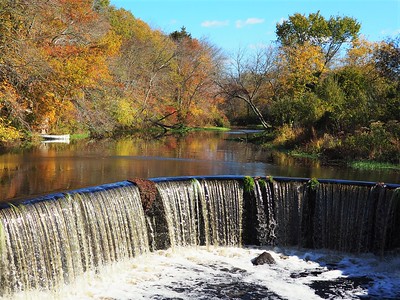
PROVIDENCE, R.I.—The Pawcatuck River is a treasured natural resource flowing through southern Rhode Island and Connecticut until it empties into Little Narragansett Bay near Westerly, Rhode Island. Long a hub for fishers, kayakers, and wildlife enthusiasts, the river also has a significant industrial user: the nearly 180-year-old Kenyon Industries textile mill, which literally straddles the river in Kenyon, Rhode Island.
While the Pawcatuck River watershed remains 75% forested and has received recognition by Congress as a National Wild and Scenic River, a 2.16 mile stretch of river that begins at the mill’s wastewater outfall has been designated by the state as “impaired” because it is too toxic to serve as safe habitat for fish and wildlife.
“The impairment of the Pawcatuck River is no mere happenstance,” explains National Environmental Law Center (NELC) staff attorney Matthew Donohue. “For at least the last 10 years, the Kenyon mill has continuously discharged illegal concentrations of copper, a toxic pollutant, and has repeatedly failed to reduce the toxicity of its industrial effluent to safe levels.”
On Aug. 23, NELC attorneys took action to stop these violations by filing a Clean Water Act enforcement suit on behalf of Environment Rhode Island against Kenyon Industries, Inc., and its parent company, Brookwood Companies Incorporated, for allegedly violating the Clean Water Act 1,784 times since 2017.
Clean Water Act regulations require Kenyon Industries to publicly report its pollution discharges. Based on this reporting, NELC staff determined that Kenyon has routinely discharged wastewater with concentrations of copper that are more than two and a half times its legally permitted limits. Kenyon’s self-reporting also shows repeated failures of tests designed to measure the lethality of its effluent to aquatic organisms.
Although Kenyon argues that the copper in its wastewater is not lethal at the concentrations discharged, this has not been clearly established. Moreover, even the sublethal effects of copper can seriously impair fish and other aquatic life.
Copper can be acutely toxic in freshwater ecosystems. It can be absorbed by fish through their gills, according to a 2012 study by The Nature Conservancy. And a 2020 academic study showed that copper can cause chronic harm as it bioaccumulates in fish tissue, impairing olfactory receptors, causing severe organ damage, depressing immune response, and leading to dangerous behavioral abnormalities. The Pawcatuck River ecosystem is home to 67 species of fish.
“The best way to protect the river,” notes NELC’s Donohue, “is to remove the excess copper from the wastewater.”
The lawsuit, filed in federal district court in Providence, seeks a court order putting a stop to the illegal discharges and requiring actions to remediate past harm. NELC attorneys will also seek an appropriate civil penalty to deter Kenyon and other polluters from violating our environmental laws.